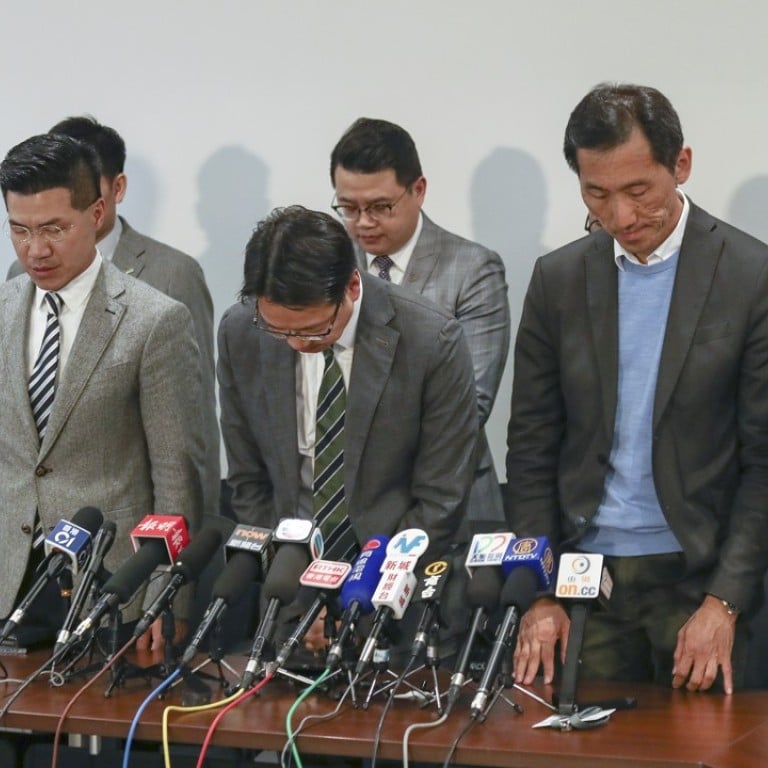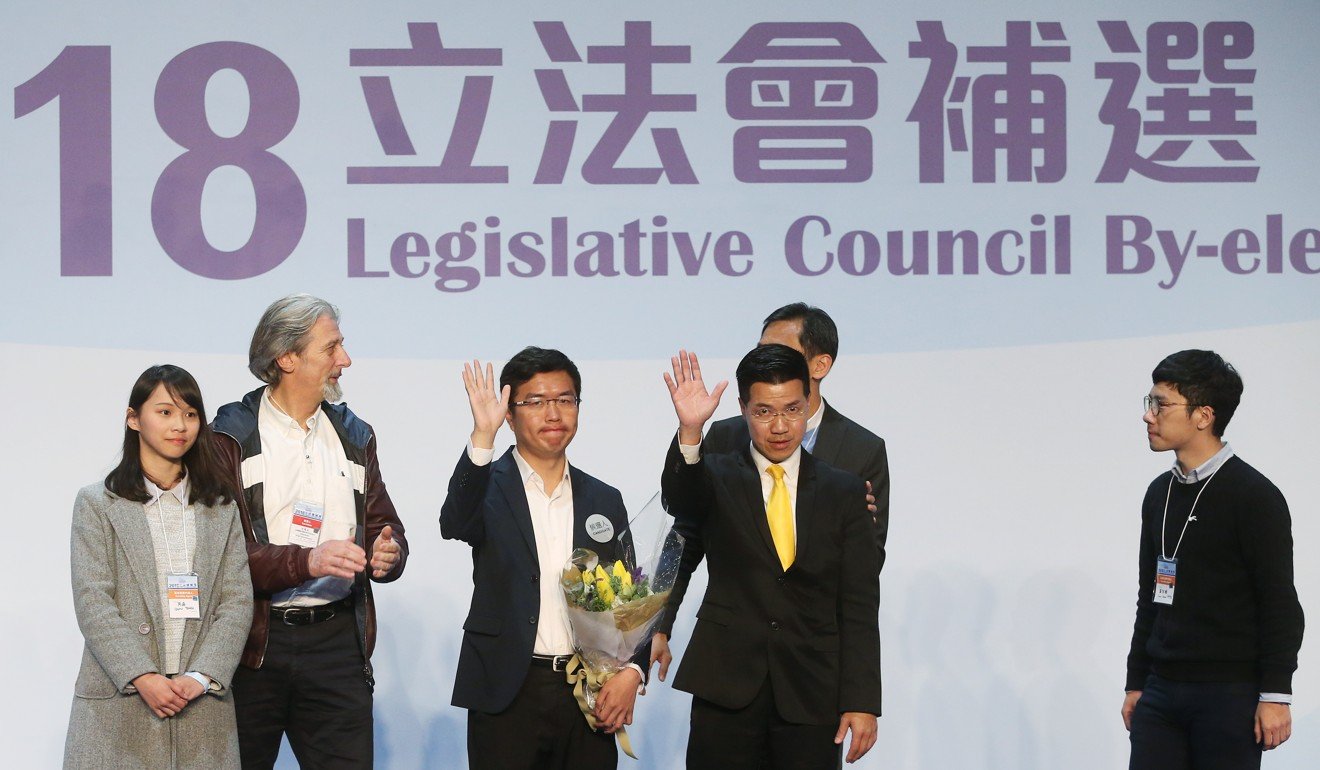
Hong Kong’s opposition pan-democrats apologise to supporters after Legco by-election defeat
City politics watchers say defeat at the polls may show that some have grown tired of the pan-democrats’ tactics
Hong Kong’s opposition politicians are picking up the pieces after suffering a crushing setback in Sunday’s Legislative Council by-election, which saw them lose two out of four seats that were theirs to retain and left them with a diminished vote share that reflected a widening rift with their traditional support base.
The loss marked the first time that pan-democrats squandered a by-election in the city’s polling history since its 1997 handover to Chinese sovereignty, and prompted them to make a public apology in front of the media’s cameras on Monday.
It was a far cry from the comeback they had expected to make, riding on what they had touted as a wave of public anger over the disqualification of elected lawmakers from their camp and Beijing’s tighter control over the city’s affairs.
“For the whole pan-democratic camp, it is a political defeat,” Chinese University political commentator Professor Ma Ngok said. “It is not that they won back two of the four seats, it is that they lost two seats previously held by them.
The biggest loser was localist Edward Yiu Chung-yim, one of the opposition camp’s star candidates, who secured about 48.8 per cent of votes but lost in the Kowloon West constituency to pro-establishment rival Vincent Cheng Wing-shun of the Democratic Alliance for the Betterment and Progress of Hong Kong (DAB).

“I will bear full responsibility for the failure,” Yiu said, while denying that he had underestimated the competition. “I lack experience in direct elections and did not plan my campaigns well enough. I did not go to some of the stations that I should have visited to canvass support.”
The result in Kowloon West, previously a pan-democrat stronghold, marked a shock reversal of fortune capping a by-election that saw the opposition camp’s vote share drop to between 44 per cent and 51 per cent in the three geographical constituencies from 60 per cent in the past and about 55 per cent in recent years.
Gary Fan Kwok-wai of the NeoDemocrats and non-affiliated Au Nok-hin managed to win the other two directly elected seats for the opposition in the New Territories East and Hong Kong Island geographical constituencies respectively.
Moderate pro-establishment candidate Tony Tse Wai-chuen beat pan-democrat Paul Zimmerman by grabbing 55.5 per cent of votes to take the fourth seat on offer, in the trade-based architectural, surveying, planning and landscape functional constituency.
For the whole pan-democratic camp, it is a political defeat
Yiu’s defeat meant the pan-democrats failed to take back the power to veto their rivals’ moves in Legco, which they lost when six of them were disqualified. It left the pro-establishment bloc, which already has an edge in the functional constituencies, with 17 seats in the geographical constituencies to the pan-democrats’ 16.
As a consequence, opposition lawmakers will not be able to block their rivals’ future bids to further tighten the legislature’s rule book against filibustering, a regular tactic used by the pan-democrats.
Tough warning to Hong Kong given by top Chinese leader, who urges recognition of Beijing’s sovereignty
Beijing has taken an increasingly hard line against pro-democracy activists in Hong Kong in recent years. During a visit to the city last July, Xi warned that Beijing would not tolerate any challenge to its authority.
On election day, Tung Chee-hwa, Hong Kong’s first post-handover chief executive and now a vice-chairman of the nation’s top political advisory body, the Chinese People’s Political Consultative Conference, also told people to vote for candidates who were “constructive, pragmatic and true-heartedly serving Hong Kong”, while “advocacies of Hong Kong independence and self-determination will cost the city a heavy toll”.
Political observers also noted that pro-establishment lawmakers could take advantage of their election advances to bulldoze controversial policies or laws through Legco.
“Now that the pro-Beijing camp knows the disqualification saga does not matter much, they may get bolder to put forward moves they might not have dared to in the past, and further tighten the legislature’s rule books to restrict the pan-democrats,” Dr Cheung Chor-yung of City University said.
Lawmaker Charles Mok, also convenor of the pan-democrats, shared similar worries while cautioning against over-interpretation of their defeat in one constituency.
“Losing in an election is, of course, not a good thing,” he said. “We would like to promise our supporters and those who support and treasure the core values of Hong Kong that we will continue to stay united to fight the many possible battles in the future, both inside and outside the Legco chamber.

“We will have a review of the by-election results and find out what we have not done well in order to avoid similar mistakes in future elections. We believe there are many interrelated factors and it is too early to jump to a simple conclusion at this stage.”
Professor Linda Li Che-lan of City University said the disqualification saga, which started some 18 months ago, was a bygone issue for many voters now.
“I am not saying that people are not angry about the disqualification, but elections cannot be all about disqualification of councillors,” she said. “You have to show how you can improve the voters’ livelihoods and address their concerns about such issues,” she said.
She also suggested the turnout rate of 43 per cent, compared with 58.3 per cent for the 2016 general elections, reflected voter fatigue over the pan-democrats’ tactics.
The four newly elected lawmakers are expected to take their oath of office on Wednesday next week.
Meanwhile, a Hong Kong Island voter was expected to mount a judicial review on Tuesday challenging the validity of Au Nok-hin’s nomination as a candidate in the by-election.
Former pro-government legislator Wong Kwok-hing, who is supporting the voter, said several complaints had been filed to the Registration and Electoral Office and the Electoral Affairs Commission in the past two weeks, questioning the authorities’ decision to allow Au to run.
Wong said they wanted the court to handle their application before Au’s swearing in, recalling how the candidate had in a past protest burned a copy of the Basic Law and professed his support for Hong Kong’s self-determination.


